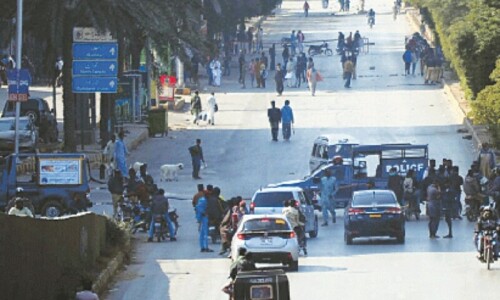KARACHI: “In the West, all we hear about Pakistan is about terrorism, the Taliban and heatwave, but to me that’s not Pakistan. Pakistan is about the people I’ve met who invited me into their lives.” This was the concluding remark made by Belgian photographer Wendy Marijnissen at the end of her presentation titled ‘A photographic journey into the life of women in Pakistan’ at the PMA House on Saturday.
Ms Marijnissen first told the audience about herself. She said in Belgium music and theatre were her passions. It was later on that she developed a fondness for photography. In 2006 she went to Palestine and Israel, where she became interested in knowing the lives of normal people living in conflict zones.
With the help of pictures shown on a big screen, Ms Marijnissen narrated her experiences in Palestine. She showed pictures of a boy taking guitar lessons and of a diner where there was an Elvis imitator. However, she said, one could not escape the (political) situation in that region, as apart from other things there was also a big picture of the wall separating Israelis and Palestinians.
There was also a photograph of a Palestinian woman whose house was taken away by the settlers. Despite that she was watering the plants in her house from the outside. The very next moment, as shown in the photograph that followed, settlers came and pushed her away, which triggered a fight.
Ms Marijnissen said it was in 2009 that she came to Pakistan for the first time and “a new journey started”. She landed in Lahore, where she moved around the streets of the city, especially old city. What she saw in a Muharram procession, she claimed, she had never seen before. Her next stop was Karachi, which afterwards became her “home away from home”. Here her focus turned to maternal health issues, particularly on fistula. She said she was lucky to meet Dr Shershah Syed, who took her on a journey which allowed her to know the situation better.
Ms Marijnissen said she saw, and photographed, many pregnant women giving birth to dozens of children. “It was like a miracle unfolding in front of my eyes,” she enthused. She went to quite a few surgical camps in the interior of Sindh, where she realised that rural women of Pakistan had no health facilities. She narrated a few stories from her experiences of visiting surgical camps, one of which was about a young woman who needed an emergency C-section to be performed. Luckily, there was a team from Karachi there who performed the surgery on her. She showed a photograph in which the young woman’s mother was kissing her before the operation.
In 2010 when the area was affected by the floods, Ms Marijnissen said she was not here but “came as quickly as I could”.
During her stay in Sindh she witnessed, and captured, many moving stories, one of which was about an old couple who had lost everything after being uprooted from their village but were still optimistic about things. At that point, she said, it became important to her to know what it meant for pregnant women to live under trying circumstances. It led her to meet a woman (who is sporting a big smile in the image shown in the presentation) who already had three children. She was living in a tent with her family. She was surprised to see her give birth to her fourth child and then a day later went back to the camp doing chores. “In Belgium, the woman who gives birth to a child is kept for 3 to 5 days in hospital,” she said with an element of surprise in her voice.
At the end of her presentation, Ms Marijnissen showed a picture of small portraits of Pakistani people and commented that in the West Pakistan was always in the news for the wrong reasons — terrorism, heatwave, the Taliban — but to her that was not the real Pakistan. The real Pakistanis were the ones who invited her into their lives. After that she ran a video, a montage of her photographs, about maternal health issues in Pakistan.
During the question-and-answer session, when a member of the audience drew her attention to the fact that the pictures she had chosen for her talk were not accompanied by captions and therefore did not make her message clear, she said shared humanity was her message.
Published in Dawn, July 12th, 2015
On a mobile phone? Get the Dawn Mobile App: Apple Store | Google Play
















































Dear visitor, the comments section is undergoing an overhaul and will return soon.